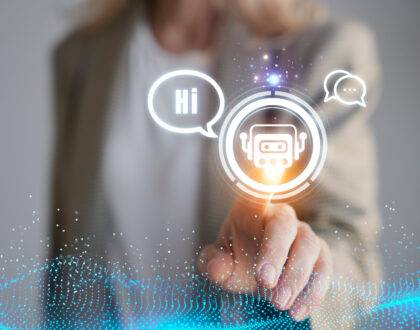Voice Assistants and the Future of Human-Computer Interaction

by Web Digital
The rapid advancement of technology has led to significant changes in how we interact with our devices. Voice assistants, powered by artificial intelligence (AI) and natural language processing (NLP), have emerged as a prominent and transformative force in human-computer interaction. This article explores the role, their impact on our daily lives, and the implications for the future of technology and communication.
I. The Rise of Voice Assistants
A. What Are Voice Assistants?
Voice assistants, also known as virtual assistants or voice-activated assistants, are AI-powered software programs designed to respond to voice commands and provide users with information, perform tasks, or control devices. Examples of popular include Amazon’s Alexa, Apple’s Siri, Google Assistant, and Microsoft’s Cortana.
B. The Evolution of Voice Technology
Early voice recognition systems were often limited in their capabilities and accuracy. However, advancements in AI and machine learning have transformed voice assistants into sophisticated tools that can understand and respond to natural language with a high degree of accuracy.
II. Voice Assistants in Everyday Life
A. Smart Speakers and Home Automation
One of the most visible applications of voice assistants is through smart speakers like Amazon Echo and Google Home. These devices allow users to control smart home devices, play music, set reminders, and access information, all through voice commands. Home automation and voice control have become integral parts of many households, making life more convenient and efficient.
B. Mobile Devices
Voice assistants have also made their way into mobile devices, such as smartphones and tablets. Siri, Google Assistant, and others provide users with a hands-free way to perform tasks like sending texts, setting alarms, or getting directions. These capabilities have transformed how people interact with their mobile devices.
C. Automotive Integration
Voice assistants have become essential in modern vehicles, enabling drivers to make calls, send messages, and control navigation without taking their hands off the wheel.
D. Customer Service and Business Applications
Voice assistants are increasingly being used in customer service and business applications. Companies use AI-powered virtual assistants to provide automated customer support, answer common questions, and even assist with online shopping.
III. The Impact on Human-Computer Interaction
A. Natural Language Understanding
Voice assistants have greatly improved natural language understanding. They can recognize various accents, dialects, and even different languages, making them accessible and user-friendly for a global audience. This development has democratized technology access, especially for individuals with limited typing or reading abilities.
B. Hands-Free and Multimodal Interaction
Voice assistants offer hands-free interaction, allowing users to perform tasks and access information without the need for a keyboard or touch screen. This has opened up opportunities for multitasking and convenience in various settings, such as cooking, driving, or working out.
C. Accessibility and Inclusivity
Voice assistants have had a transformative impact on accessibility. They enable individuals with disabilities, such as those with visual or motor impairments, to interact with digital devices more effectively. This inclusivity is a significant step towards creating a more accessible digital world.
IV. Challenges and Concerns
A. Privacy and Data Security
The use of voice assistants raises concerns about user privacy and data security. Voice commands are recorded and transmitted to cloud servers for processing, which can lead to privacy breaches if not adequately protected. Ensuring the security of personal data is a critical consideration for voice assistant technology.
B. Misunderstandings and Errors
While voice recognition technology has made great strides, it is not infallible. Misunderstandings and errors in interpreting voice commands can lead to frustration for users. Addressing these challenges is crucial for improving the user experience.
C. Dependence and Isolation
The convenience of voice assistants can lead to over-dependence on technology, potentially reducing face-to-face interactions and isolating individuals. It is essential to strike a balance between using voice assistants for efficiency and maintaining meaningful human connections.
V. The Voice Assistants of Human-Computer Interaction
A. Advancements in NLP and AI
The future of human-computer interaction is likely to be shaped by ongoing advancements in natural language processing and artificial intelligence. Assistants will become even more proficient at understanding context, nuances, and user preferences, making interactions more intuitive and personalized.
B. Integration with IoT and Smart Devices
Voice assistants are expected to play a central role in the Internet of Things (IoT) ecosystem, connecting and controlling an ever-expanding range of smart devices. This will lead to more seamless and interconnected experiences in our homes, workplaces, and daily lives.
C. Enhanced Accessibility and Inclusivity
As voice assistant technology continues to evolve, it will further enhance accessibility and inclusivity. Innovations in speech recognition and assistive features will ensure that people with disabilities have equal access to technology and information.
D. Ethical Considerations
As voice assistant technology advances, ethical considerations will become more prominent. Balancing convenience with privacy, ensuring data security, and addressing issues of bias and discrimination in AI algorithms will be essential in shaping ethical use.
Conclusion
Voice assistants have ushered in a new era of human-computer interaction, transforming the way we live, work, and communicate with digital devices. They offer convenience, accessibility, and inclusivity, while also presenting challenges related to privacy, reliability, and dependence. As technology continues to advance, the future of human-computer interaction with Assistants holds exciting possibilities, from greater personalization and integration with smart devices to enhanced accessibility and ethical use. The evolution of voice assistant technology promises to continue shaping the way we interact with the digital world, making it more intuitive, efficient, and connected.
Recommended Posts

The Evolution of AI in Education
December 4, 2023

Blockchain and the Future of Digital Voting
December 4, 2023

